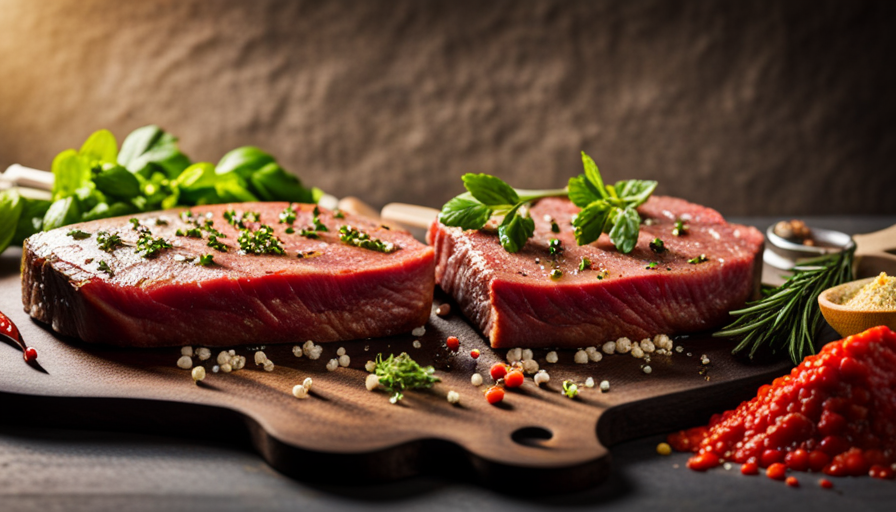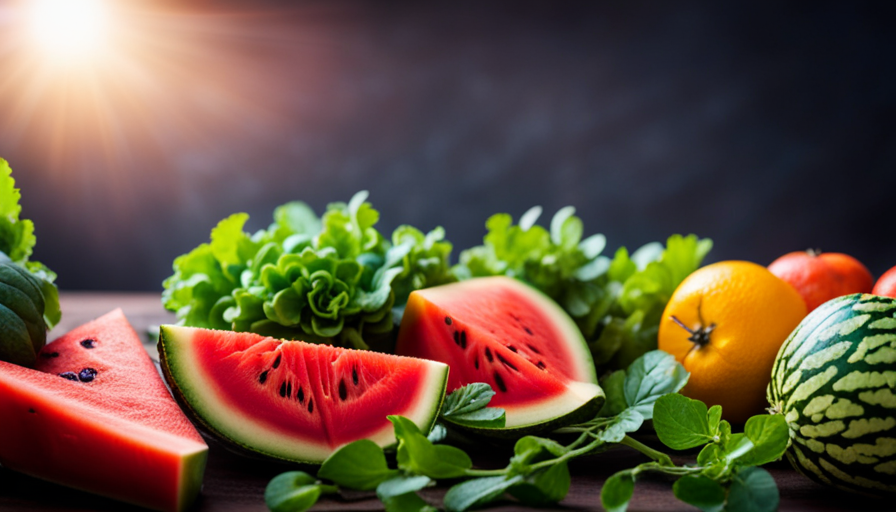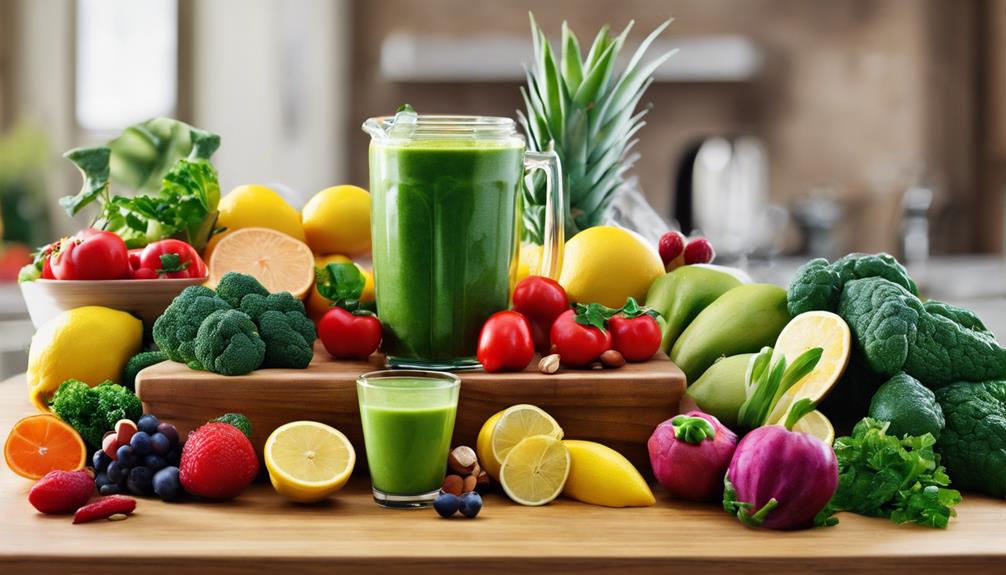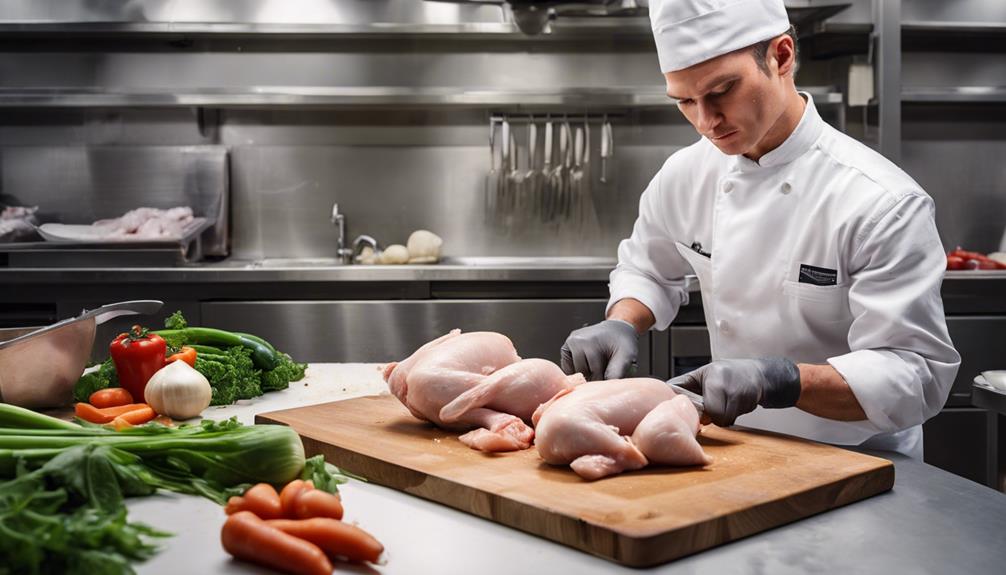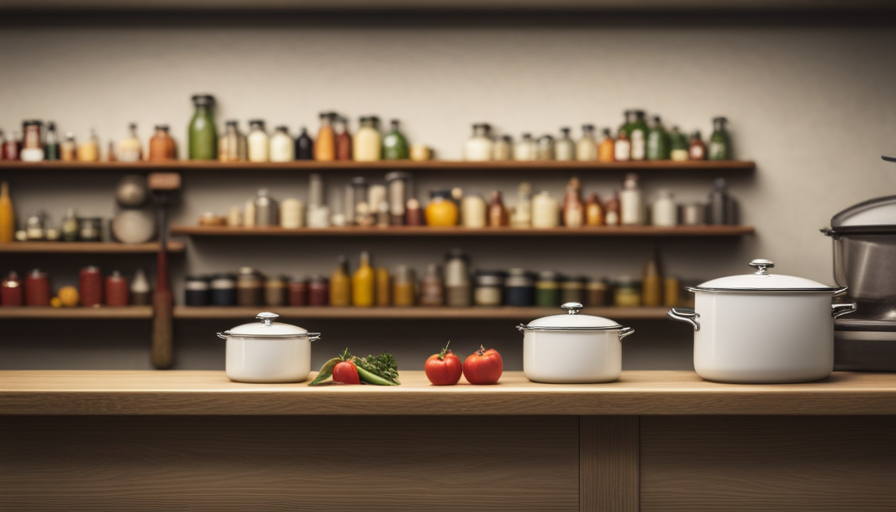In line with the popular saying, ‘You are what you eat,’ it is important to prioritize food safety guidelines when using marinades for raw meat. Proper handling and storage are crucial to avoid the risk of harmful bacteria growth.
Choosing the right marinade ingredients and marinating times can enhance the flavor of your meat while ensuring its safety. Cross-contamination must be avoided at all costs, which means using separate utensils for raw and cooked meat.
Leftover marinade should be discarded, as it can contain bacteria from the raw meat. Cooking the meat to the proper temperature is vital to kill any potential pathogens. And don’t forget to let your meat rest after cooking to allow the juices to redistribute, resulting in a more flavorful and tender meal.
By following these guidelines, you can enjoy delicious marinated meat while keeping your health intact.
Key Takeaways
- Proper handling and storage of marinades are essential for food safety.
- Separate utensils should be used for raw and cooked meat to avoid cross-contamination.
- Leftover marinade should be discarded to prevent bacterial growth.
- Storing marinades on the bottom shelf of the refrigerator prevents potential leaks onto other items.
Importance of Proper Handling and Storage of Marinades
Properly handling and storing marinades is like tucking away a secret treasure, ensuring that the flavors meld together and create a mouthwatering explosion when added to raw meat. When it comes to food safety, it’s crucial to follow the guidelines for proper storage to prevent bacterial growth and keep our meals safe to consume.
To begin, it’s essential to store marinades in the refrigerator at a temperature below 40°F (4°C). This cold environment slows down the growth of bacteria, reducing the risk of foodborne illnesses. Additionally, marinades should be stored in airtight containers to prevent cross-contamination with other foods and to preserve the flavors.
Another important aspect of proper storage is to keep the marinades away from other raw meats or ready-to-eat foods. This separation is crucial to avoid any potential contamination. It’s recommended to store marinades on the bottom shelf of the refrigerator, ensuring that any potential leaks don’t drip onto other items.
By following these guidelines for proper storage, we can maintain the freshness and integrity of the marinades while preventing bacterial growth. With these precautions in mind, we can now move on to the next section and discuss the importance of choosing the right marinade ingredients.
Choose the Right Marinade Ingredients
To whip up a tasty marinade, make sure you’ve got the right ingredients on hand. The marinade ingredients you choose will determine the flavor infusion and overall success of your dish. Here are some essential ingredients to consider:
- Acids: Use acidic ingredients like vinegar, citrus juices, or yogurt to tenderize the meat and enhance its flavor.
- Oils: Incorporate oils like olive oil, sesame oil, or vegetable oil to add moisture and prevent sticking.
- Aromatics: Add depth and aroma to your marinade by including ingredients like garlic, onions, herbs, or spices.
- Sweeteners: Balance out the acidity with sweeteners such as honey, sugar, or maple syrup.
- Salts: Season your marinade with salt, which helps to bring out the flavors of the other ingredients.
Using the right combination of these ingredients will result in a marinade that not only enhances the taste of your meat but also ensures food safety. Remember to marinate your meat in the refrigerator and discard any leftover marinade that has come into contact with raw meat to prevent cross-contamination.
Now that you know about choosing the right marinade ingredients, let’s move on to marinating times and techniques to further enhance your culinary skills.
Marinating Times and Techniques
Let’s now explore the best times and techniques for marinating to take your culinary skills to the next level! When it comes to marinating, the duration is crucial to ensure maximum flavor infusion. The length of time you marinate your meat depends on the type of meat and the size of the pieces. It is generally recommended to marinate poultry and seafood for 30 minutes to 2 hours, while beef, pork, and lamb can be marinated for 2 to 24 hours. For tougher cuts of meat, longer marinating times can help tenderize them.
To give you a better idea of marinating times, here’s a table that outlines the recommended durations for different meats:
| Meat | Marinating Time (in hours) |
|---|---|
| Poultry | 0.5 – 2 |
| Seafood | 0.5 – 2 |
| Beef, Pork | 2 – 24 |
| Lamb | 2 – 24 |
Proper marinating techniques are also key to achieving the best results. Make sure to evenly coat the meat with the marinade and place it in a sealed container or resealable plastic bag. Refrigerate the marinating meat to prevent bacterial growth. Additionally, you can enhance flavor infusion by occasionally turning the meat and massaging the marinade into it.
Now that you have mastered marinating times and techniques, let’s move on to the next section about avoiding cross-contamination when handling raw meat.
Avoid Cross-Contamination
Avoiding cross-contamination when handling raw meat is like walking through a minefield, one wrong move and you risk spreading harmful bacteria to other surfaces. To prevent bacterial growth and ensure safe marinating techniques, it’s crucial to follow these guidelines:
-
Keep raw meat separate: Store raw meat in leak-proof containers on the lowest shelf of the refrigerator to prevent any drips or spills onto other foods. Never place cooked meat on the same plate that held raw meat.
-
Clean and sanitize surfaces: Thoroughly wash cutting boards, countertops, and utensils with hot, soapy water after each use. Use a sanitizing solution of one tablespoon of unscented bleach per gallon of water for extra precaution.
-
Use separate marinade: Don’t reuse marinade that has come into contact with raw meat. It may contain harmful bacteria. Instead, make a fresh batch of marinade for basting or use a separate portion for cooked meat.
By following these precautions, you can minimize the risk of spreading bacteria and ensure a safe marinating process. Now, let’s discuss the importance of using separate utensils for raw and cooked meat to further prevent cross-contamination.
Use Separate Utensils for Raw and Cooked Meat
When handling raw and cooked meat, it is essential to use separate utensils to prevent the transfer of harmful bacteria. This simple step can greatly reduce the risk of foodborne illnesses. Using the same utensils for both raw and cooked meat can lead to cross-contamination, where bacteria from the raw meat is transferred to the cooked meat, increasing the chances of food poisoning.
To emphasize the importance of using separate utensils, let’s take a look at the following table:
| Raw Meat Utensils | Cooked Meat Utensils |
|---|---|
| Cutting board | Cutting board |
| Knife | Knife |
| Tongs | Tongs |
As you can see, using the same utensils for both raw and cooked meat can easily lead to contamination. By using separate utensils, you can ensure that harmful bacteria from the raw meat does not come into contact with the cooked meat, keeping you and your family safe.
Now that we understand the importance of using separate utensils, let’s move on to the next step in ensuring food safety: marinating in the refrigerator.
Marinate in the Refrigerator
To ensure your marinated dishes are safe and flavorful, it’s important to note that refrigerating marinated meat reduces the risk of bacterial growth by 90%.
-
Marinating Temperature:nnWhen marinating meat, it’s crucial to keep it at a safe temperature to prevent the growth of harmful bacteria. The ideal temperature for marinating meat is below 40°F (4°C). This means that you should always marinate your meat in the refrigerator, where the cold temperature inhibits bacterial growth.
-
Marinating Containers:nnChoosing the right container for marinating is essential to maintain food safety. Opt for non-reactive containers such as glass or food-grade plastic, which won’t interact with the marinade and contaminate the meat. Ensure the container is properly sealed to prevent any cross-contamination with other foods in the refrigerator.
-
Duration of Marination:nnFor optimal results, marinate meat in the refrigerator for at least 30 minutes to several hours, depending on the recipe. The longer you marinate, the more flavorful the meat becomes. However, avoid marinating meat for more than 24 hours, as the texture can become mushy and the flavors may overpower the meat.
Refrigerating marinated meat is just one step in ensuring food safety. The next important aspect is to discard leftover marinade.
Discard Leftover Marinade
Make sure you never waste a drop of that delicious, flavor-packed marinade by pouring it down the drain or using it as a base for a mouthwatering sauce or glaze. However, it’s important to note that once you’ve used marinade for raw meat, you shouldn’t reuse it for another purpose without taking proper precautions.
Using marinade for cooked meat can be tempting to add extra flavor, but it’s crucial to do so safely. When marinating raw meat, harmful bacteria from the meat can contaminate the marinade. These bacteria can multiply rapidly in the warm, damp environment of the marinade. Therefore, reusing marinade that has come into contact with raw meat can potentially lead to foodborne illnesses.
To prevent any risk of contamination, it’s recommended to discard leftover marinade that has been used for raw meat. Instead, prepare a separate batch of marinade for cooked meat or reserve a portion of marinade before it comes into contact with raw meat. This way, you can enjoy the flavors of the marinade without compromising food safety.
Now that we know how to handle marinades properly, let’s move on to the next step: cooking meat to the proper temperature.
Cook Meat to the Proper Temperature
After discarding leftover marinade, it is crucial to cook the meat to the proper temperature to ensure food safety. Proper cooking techniques are essential to kill any harmful bacteria that may be present in raw meat. When cooking meat, it is important to use meat doneness indicators to determine if it is cooked thoroughly. These indicators include using a meat thermometer to check the internal temperature of the meat and ensuring it reaches the recommended safe temperature for the specific type of meat being cooked. Different types of meat have different safe cooking temperatures, so it is essential to refer to a reliable source for specific guidelines. Incorporating a 3 column and 4 row table can be a helpful visual aid to understand the recommended safe cooking temperatures for various meats. By following these guidelines, you can ensure that your meat is cooked to a safe temperature, reducing the risk of foodborne illnesses. Transitioning into the subsequent section, it is important to let meat rest after cooking to allow the juices to redistribute and ensure optimal flavor and tenderness.
Let Meat Rest After Cooking
Allowing your perfectly cooked meat to rest is like giving it a peaceful retreat, allowing the flavors to harmonize and the tenderness to reach its peak.
After cooking meat to the proper temperature, it’s crucial to let it rest for the appropriate amount of time. The proper resting time varies depending on the type and size of the meat, but a general rule of thumb is to let it rest for about 5-10 minutes.
This rest period allows the juices to redistribute throughout the meat, resulting in a juicier and more delicious final product.
Resting meat also has other benefits. It helps retain moisture, as the proteins in the meat relax during this time, preventing the juices from flowing out when the meat is cut. Additionally, resting allows the meat to continue cooking slightly, which can help reach the desired level of doneness without overcooking it.
Now that you know the importance of letting your meat rest, you can move on to the next step of enjoying your delicious and safe marinated meat.
Enjoy Your Delicious and Safe Marinated Meat
To fully savor the mouthwatering flavors and ensure a memorable dining experience, relish every delectable bite of your marinated meat. Marinades not only enhance the taste of meat but also provide an opportunity to experiment with different flavors.
However, it’s crucial to prioritize marinade safety to prevent any potential foodborne illnesses. Here are a few guidelines to keep in mind:
-
Properly store marinated meat: Always refrigerate raw meat that’s marinating. This helps inhibit the growth of harmful bacteria and ensures food safety.
-
Avoid cross-contamination: Never reuse marinade that’s come into contact with raw meat. This can lead to the spread of bacteria. Discard any leftover marinade or boil it before using it as a sauce.
-
Marinate in the refrigerator: It’s recommended to marinate meat in a covered container or a sealed plastic bag in the refrigerator. This prevents the growth of bacteria at room temperature.
-
Follow recommended marinating times: Different meats require different marinating times to reach optimal flavor. Refer to reliable sources for specific guidelines on marinating times for different types of meat.
By following these marinade safety guidelines, you can enjoy your delicious marinated meat while also ensuring food safety and preventing any potential foodborne illnesses.
Frequently Asked Questions
Can I reuse leftover marinade from raw meat?
Yes, you can reuse leftover marinade from raw meat, but it must be handled properly to ensure food safety. After marinating raw meat, the marinade should be discarded if it’s come into contact with any pathogens. However, if the marinade has been kept separate from the raw meat, it can be safely reused. Store it in a clean, airtight container in the refrigerator for up to 2 days. Make sure to bring it to a boil before using it again to kill any bacteria.
How long can I marinate meat at room temperature?
To marinate meat safely, it’s important to marinate it in the refrigerator. Marinating meat at room temperature can lead to bacterial growth and increase the risk of foodborne illnesses. The ideal temperature for marinating meat is between 40°F and 140°F. Marinating in the refrigerator ensures that the meat stays at a safe temperature.
It’s recommended to marinate meat in the refrigerator for at least 30 minutes to overnight, depending on the desired flavor and tenderness.
Can I marinate meat in a plastic bag?
Yes, you can marinate meat in a plastic bag. It’s a common and convenient method for marinating. However, there are alternatives to plastic bags that can be used for marinating techniques. For example, you can use glass or stainless steel containers with a tight-fitting lid. These alternatives are also safe and effective for marinating meat. It’s important to ensure that the container or bag is clean and properly sealed to prevent any cross-contamination.
Is it safe to marinate meat overnight?
Marinating meat overnight can be safe and even beneficial in terms of enhancing flavor and tenderness. However, it’s crucial to marinate meat in the refrigerator to prevent bacterial growth. This ensures that the meat stays at a safe temperature and reduces the risk of foodborne illnesses. By allowing the marinade to penetrate the meat for a longer period of time, it can result in a more flavorful and juicy end product.
Are there any specific marinade ingredients to avoid when marinating raw meat?
When it comes to marinade safety and marinating techniques, it’s important to be cautious of certain ingredients. Avoid using ingredients that are potentially harmful when in contact with raw meat, such as unpasteurized products like raw eggs or unpasteurized dairy.
Additionally, be mindful of using marinades that contain high levels of salt or sugar, as they can increase the risk of bacterial growth. It’s best to follow safe food handling practices and use marinades that are made with fresh, clean ingredients.
Can Using Lemon Juice in Raw Food Preparation Affect Food Safety Guidelines for Marinades Used with Raw Meat?
Using lemon juice in raw food preparation can pose a risk when it comes to eating raw food with lemons in recipes for marinating raw meat. Lemon juice may not effectively kill harmful bacteria, so it’s crucial to follow food safety guidelines and use alternative methods for marinating raw meat.
Conclusion
In conclusion, following the food safety guidelines for marinades is essential to ensure the safety and deliciousness of your marinated meat. Proper handling and storage, choosing the right ingredients, and avoiding cross-contamination are crucial steps to prevent foodborne illnesses.
Additionally, using separate utensils for raw and cooked meat, discarding leftover marinade, and cooking meat to the proper temperature are important to eliminate any potential risks.
Remember, food safety should never be taken lightly. So, next time you marinate your meat, keep these guidelines in mind and enjoy a mouthwatering and safe meal. Bon appétit!

